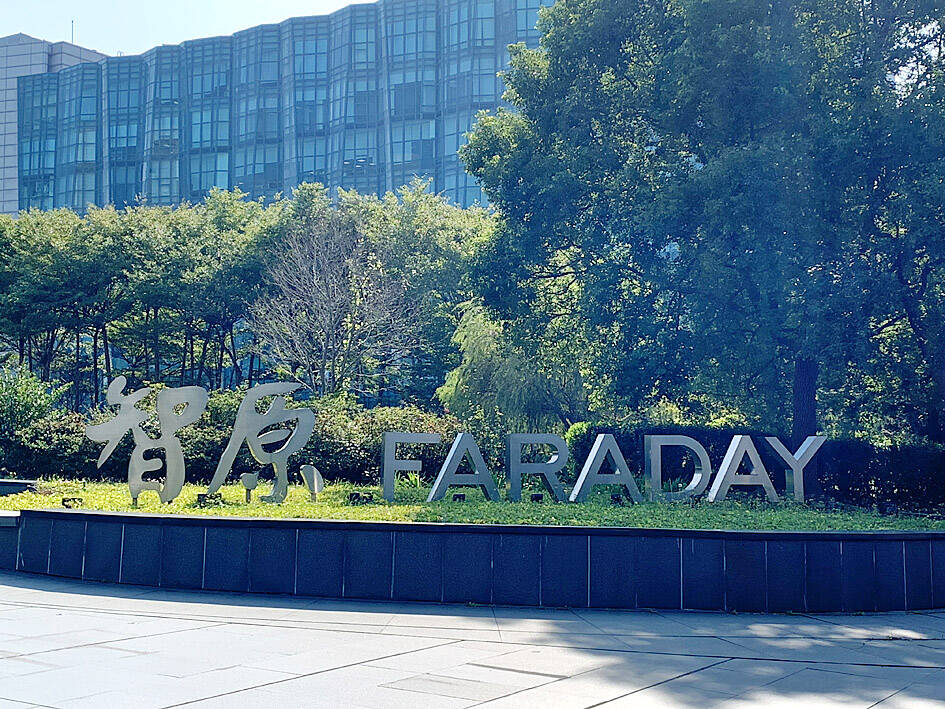Faraday Technology Corp (智原科技), which designs application-specific ICs, on Tuesday reported better-than-expected profit for last quarter, saying that it is on track to achieve its revenue growth target of more than 60 percent this year, due to resilient demand.
Net profit was NT$599 million (US$18.59 million), up 83.4 percent year-on-year, but down 9.3 percent quarter-on-quarter. Earnings per share were NT$2.41, up from NT$1.31 a year earlier, but down from NT$2.66 the previous quarter.
Growth momentum would extend into next year, bucking the macroeconomic and semiconductor industry’s downtrend, the firm said.

Photo: Grace Hung, Taipei Times
While its microcontroller unit business faced inventory adjustments over the past two quarters, the effects eased last quarter as the sales exposure of microcontroller units fell to 7 percent of the company’s total revenue last quarter, it said.
Some customers have paid in full for microcontroller unit deliveries, or half the amount, it added.
The Hsinchu-based company said it is positive about next year’s growth, due to an increase in its new design projects and growth momentum for major applications, including 5G, switches and automotive applications.
“Although most semiconductor companies are conservative about next year’s outlook amid growing macroeconomic uncertainties, Faraday will continue to maintain its growth momentum,” Faraday president Steve Wang (王國雍) told an earnings conference.
As the company designs chips mostly used in energy management — such as smart meters, artificial intelligence of things for smart manufacturing, automotive products and solar energy — its business is less vulnerable to changes in the macro environment and geopolitical tensions, Wang said.
The US’ newest semiconductor export controls on China should have no impact on the company’s business, but Faraday is closely monitoring to see whether there are any ripple effects, Wang said.
Nonetheless, the Chinese market has relatively lower order visibility, compared with the US, Europe and Japan, he said.
Faraday’s growth next year would also be aided by increased adoption of more advanced technologies, including 28-nanometer and 40-nanometer chips, Wang said.
He added that about 90 percent of new application-specific ICs are to be made on the two process nodes next year.
Revenue this quarter would increase by a low single-digit percentage, supported by Faraday’s non-recurring engineering business, from NT$3.24 billion last quarter, while revenue from intellectual property royalties and application-specific ICs would drop slightly this quarter from a quarter earlier, the company said.
Faraday charges non-recurring engineering costs and intellectual property royalties for helping customers design new chips. Customers usually pay the non-recurring engineering costs before the product is manufactured.
Faraday’s non-recurring engineering business accounted for 13 percent of its revenue last quarter, compared with 75 percent generated from its application-specific ICs business, it said.
Gross margin would drop slightly this quarter, compared with 48.6 percent last quarter, it said.
Wang said that he expects the company to have a good start next year, as revenue would be higher next quarter than this quarter.

The demise of the coal industry left the US’ Appalachian region in tatters, with lost jobs, spoiled water and countless kilometers of abandoned underground mines. Now entrepreneurs are eyeing the rural region with ambitious visions to rebuild its economy by converting old mines into solar power systems and data centers that could help fuel the increasing power demands of the artificial intelligence (AI) boom. One such project is underway by a non-profit team calling itself Energy DELTA (Discovery, Education, Learning and Technology Accelerator) Lab, which is looking to develop energy sources on about 26,305 hectares of old coal land in

Taiwan’s exports soared 56 percent year-on-year to an all-time high of US$64.05 billion last month, propelled by surging global demand for artificial intelligence (AI), high-performance computing and cloud service infrastructure, the Ministry of Finance said yesterday. Department of Statistics Director-General Beatrice Tsai (蔡美娜) called the figure an unexpected upside surprise, citing a wave of technology orders from overseas customers alongside the usual year-end shopping season for technology products. Growth is likely to remain strong this month, she said, projecting a 40 percent to 45 percent expansion on an annual basis. The outperformance could prompt the Directorate-General of Budget, Accounting and

Netflix on Friday faced fierce criticism over its blockbuster deal to acquire Warner Bros Discovery. The streaming giant is already viewed as a pariah in some Hollywood circles, largely due to its reluctance to release content in theaters and its disruption of traditional industry practices. As Netflix emerged as the likely winning bidder for Warner Bros — the studio behind Casablanca, the Harry Potter movies and Friends — Hollywood’s elite launched an aggressive campaign against the acquisition. Titanic director James Cameron called the buyout a “disaster,” while a group of prominent producers are lobbying US Congress to oppose the deal,

Two Chinese chipmakers are attracting strong retail investor demand, buoyed by industry peer Moore Threads Technology Co’s (摩爾線程) stellar debut. The retail portion of MetaX Integrated Circuits (Shanghai) Co’s (上海沐曦) upcoming initial public offering (IPO) was 2,986 times oversubscribed on Friday, according to a filing. Meanwhile, Beijing Onmicro Electronics Co (北京昂瑞微), which makes radio frequency chips, was 2,899 times oversubscribed on Friday, its filing showed. The bids coincided with Moore Threads’ trading debut, which surged 425 percent on Friday after raising 8 billion yuan (US$1.13 billion) on bets that the company could emerge as a viable local competitor to Nvidia